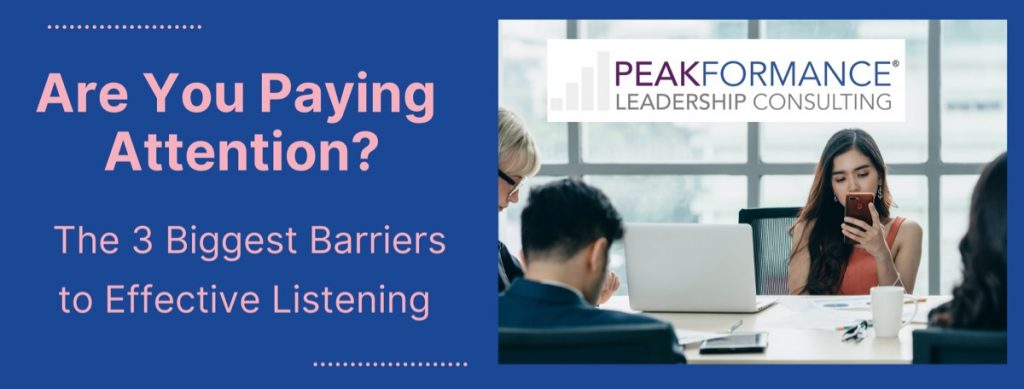The 3 Biggest Barriers to Effective Listening
Do you find listening and being attentive more challenging than ever?
We have so many distractions and priorities that compete for our attention. It really is difficult to quiet the noise and be present in a conversation and genuinely listen. Listening may be more difficult than ever, but it is no less important. As leaders we rely on listening to identify opportunities, issues, and matters that need our attention. Being truly present in conversations is essential to developing our emotional intelligence, or our situational awareness. Following are three common barriers to effective listening and strategies to overcome them:
Got to Check That Device! – This has to be number 1, right?!?! It is estimated that we check our devices on average almost 100 times a day. Do the math on that! When checking our devices in a meeting or during a conversation we lose continuity and connection which makes it easy to miss important details. It also sends a message to others that what they are saying is less important.
Strategy: Set your device aside until the meeting or conversation is over. Is there anything that can’t wait? Really?? Better yet, leave your device in another room or put it away. You will survive! I promise. And your genuine presence will be much appreciated!
Let’s Move This Along! – In this time of “everything must be done immediately” our mind is constantly racing from one thing to the next. When our mind is active balancing activities and tasks it makes it very difficult to listen. The urgency to move the conversation along can cause you to miss very important details that are essential to achieve the best outcome.
Strategy: Work on conditioning yourself and your team that everything is not urgent. Pressing to accelerate conversation or meetings may seem like you are accomplishing more – but you are probably not. Taking extra time and truly being present in a conversation will help achieve the best outcome. The best outcome saves time in the long-run.
I Already Know the Best Outcome! – Due to the first two distractions we have a tendency to start a conversation or meeting by assuming we already know the best outcome. “With so much to do, if everyone would just accept my approach we can move on”. This very common tendency shuts down valuable feedback and ulimately slows progress by limiting buy-in. A collaborative environment where all are genuninly present and listening will always produce a better outcome.
Strategy: Developing a culture that values and supports collaboration takes Leadership. It takes leadership that recognizes how important it is to take the time to get valuable feedback from a team with diverse perspectives. Consider developing values that reinforce teamwork and collaboration so that they become weaved into the fabric of the organization culture.
It takes effort to quiet the noise and focus on conversations. So ask your self – Am I paying attention?
As an Executive Leadership Advisor Joe partners with leaders to expand their capacity to develop high performing teams and cultures. Learn more about advisory services and schedule time with Joe at: www.peakformanceconsulting.com/contact
